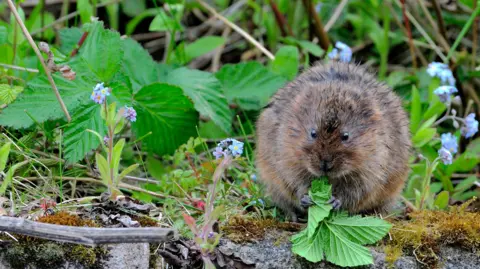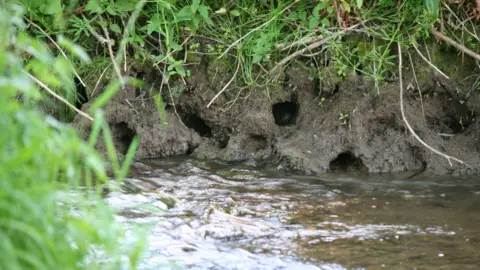'Vole-unteers' sought to stem creature's decline
 Craig Jones Wildlife Photography
Craig Jones Wildlife PhotographyVolunteers are being sought to survey river banks as part of ongoing efforts to save Britain's fastest declining mammal.
The People's Trust for Endangered Species (PTES) said the native water vole population has plummeted by 90% since the 1970s.
It is asking for "vole-unteers" to check sites across the North East and Cumbria.
The findings would be compared to previous years' numbers to determine where populations remain, or where they have been lost or need urgent help.
The initiative runs from 15 April to 15 June and people can choose from more than 700 pre-selected river bank or stream sites, or a new one can be registered.
They should then record any tell-tale signs of water vole presence, such as burrows, droppings, footprints or the characteristic "plop" as they enter the water.
Emily Luck, Water Vole Officer at PTES, said: "Water voles hold the unfortunate title of Britain's fastest declining mammal and are listed as endangered on the Red List for Britain's Mammals, reflecting the seriousness of their decline.
"The survey results show how populations are changing, where water voles remain and where they've been lost.
"This is crucial as it allows us to understand how we can help by restoring degraded rivers, improving connectivity between wetlands and controlling invasive American mink."
Last year, five sites in Cumbria were surveyed, with voles found at two - both near Haweswater Reservoir, where there has been a reintroduction project.
However none were found to be present at the one County Durham site near Blanchland.
 E Marnham
E MarnhamPTES is keen to recruit volunteers in Northumberland and on Teesside where no sites were surveyed last year.
Emily Luck said: "There are lots of pre-selected sites in both areas available to choose from, and, if none of these are close to where you live, you can register a new site too and be the first person to survey that area.
"And, just because water voles weren't spotted last year, it doesn't necessarily mean they aren't in the area, they may well be and we simply don't know about it yet.
"So, we really hope more folk across the north east can help by whiling away a few hours on a local riverbank looking for sightings and signs of this very special native species."
Follow BBC North East on X and Facebook and BBC Cumbria on X and Facebook and both on Nextdoor and Instagram.
